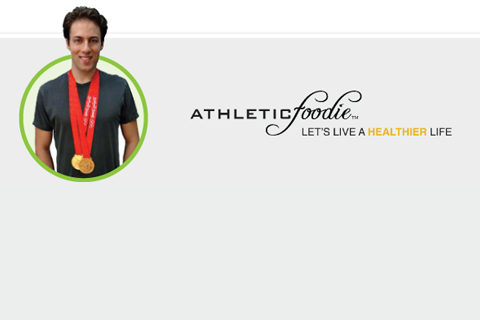Mindful Eating – Overeating may lead to underperforming

Time and time again I’ve seen a mentality that many athletes have when it comes to food: entitlement. Working upwards of two, three, even five hours a day does require a lot of nourishment. However, we all need to be careful of overkill when it comes to eating. Yes, I’m sure you have all heard about the incredible amounts that some athletes, especially swimmers, “can” eat. Maybe you are a swimmer yourself, triathlete, cyclist, basketball player, or even a skier. Chances are that, no matter what sport you play, it can be easy to overeat, which in turn could have a negative impact on your performance. Don’t kid yourself into thinking that, just because you work out hard and for a long period of time, you’re entitled to eat whatever you want and still attain the highest level of athletic performance.
As a collegiate swimmer at the University of Texas, I was one of many student athletes who took the dining room by storm. It was almost a sense of pride to be able to load my tray up with as much food as possible. I distinctly remember leaving the dining hall on more occasions than not feeling bloated, stuffed to the brim, and lethargic. This was a time in my early elite athletic career when I didn’t really know much about nutrition or fueling for performance. Nor did I have any clue how much sodium, fat, sugar, and preservatives were probably in much of the food I was eating. My physique was a bit soft and there’s no way my body was getting its best chance to perform with the food I was giving it.
Luckily I have learned a critical lesson over the years about how much and how often to eat. In 2005 I was diagnosed with high blood pressure and hence began my pursuit in the kitchen to refine my nutrition. After dozens of nutritionist appointments, countless articles and books read, and much trial and error, I’ve come to a way of working and living with food that has made a huge difference in my performance.
Here’s my main rule when it comes to how much I eat: Eat until you feel good, not until you feel full. It’s better to come back and refuel yourself an hour or two hours later than to leave a meal feeling bogged down by the amount of food eaten. I eat when I am hungry and stop when I feel satisfied, not full.
Calories, calories, calories. After the Michael Phelps story of eating 10,000 calories per day came out, everyone wanted to know how many calories I ate, and better yet, how many calories they should eat. Answers: I have no idea, and there’s no set number. Forget looking at the number of calories and start looking at what kind of calories you’re eating to provide yourself with vital nutrients. Whether you’re burning 2,000, 4,000, or 9,000 calories per day, consuming that amount of calories back in junk foods may restore the “energy” while not giving you essential fuel that benefit your mental and physical performance.
Jess Kolko is a contributing nutritionist to AthleticFoodie, the healthy living business I started. Here’s what Jess had to say about the potential negative effects of overeating:
“No matter if you are overeating with fat, carbohydrates, or protein, your body turns excess calories into fat for storage. While this storage may be good for a swim across the English Channel, it’s not so good for maximum performance in most of the events you’ll be competing in. Extra fat storage means extra pounds, and putting them on is a lot easier than getting them off. Also, a few extra pounds here and there add up over time. This excess weight can lead you down a path to chronic disease including high blood pressure, high cholesterol, increased fasting blood sugars, and even all the way to heart disease and diabetes.
Garrett’s right: Eat until you feel like you are no longer hungry. However, this can be a bit harder than it seems. It means really being in tune with your body’s hunger and fullness cues. To tap into these feelings, first things first—slow down and remove distractions. Sit at the table with your food portioned on a plate, turn off the TV, and put away your phone, computer, book, or magazine. Take time to focus on what you’re doing—eating to nourish your body and fuel your training. Stop after a little while and check in again; are you eating just to clear your plate or are you already satisfied? Learning to eat mindfully takes time but, in the long run, it’s worth it. Being conscious and in touch with what you’re eating helps you enjoy food more and slows you down to savor. You will even learn to stop when you’re no longer hungry—not when you’re stuffed.”
Next time you sit down for a meal, really think about what Jess described. Don’t immediately assume your body needs a ton of food just because you’re an athlete. We need to listen to our body cues while training to help adjust our workouts to what our body is telling us, so there’s no reason we shouldn’t listen to these cues while eating as well. Thoughtful consumption of food will make a huge difference in both how you feel and in your athletic performance down the road.






